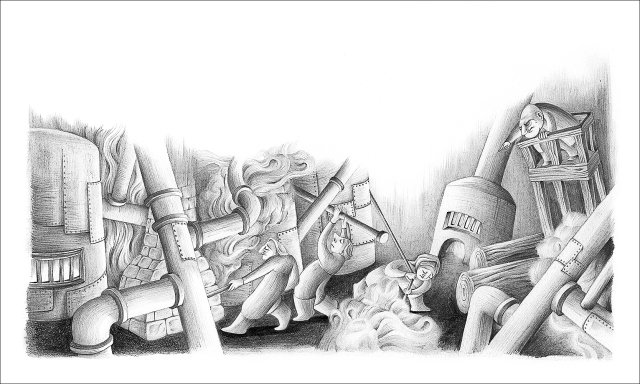Suddenly you are trapped in factory society (note the expression on your face)
Photo: Insel/Nick-Martin Sternitzke
It begins with a dream: Ten-year-old Karl dreams that a monstrous car with a pyramid-shaped roof is rolling down a hill and threatening to crush the houses of a small village. Nobody seems to be able to stop the car; everything in its path is run over. When Karl’s house also threatens to be destroyed, Karl is startled. Was that a bad omen?
Apparently! The next day, when he went into the forest with his sister Rosa to collect firewood as usual, there was a large sign hanging there: “Collecting wood is now forbidden! Wood thieves are punished severely. This section of forest is sold!”
A turning point of previously unknown proportions in the world of Karl and Rosa. They live with their parents on a small farm on the tranquil island of Feudalia. There are only a dozen small villages, each with barely more than 20 inhabitants, and a small town where Karl and Rosa sometimes go to the market. Shortly thereafter, the queen announced that a bridge would be built to the neighboring island of Capitalia and that all residents of Feudalia would have to leave their farms to work in the city’s factories that were being built. They are promised that their wealth will increase.
No way: A little later, Karl and Rosa find themselves confronted with a reality that is reminiscent of the harshest Manchester capitalism: their parents have to do monotonous work for ten hours a day, come home from the factory exhausted and yet don’t have enough money to take care of themselves being able to afford food. Karl and Rosa have to share the bed in the cramped apartment with two former neighbor boys from the village. Night shifts for young people are also common on Feudalia – which is becoming increasingly similar to the neighboring island of Capitalia. Soldiers and police pick up children playing on the streets and put them in workhouses. They are accused of being work-shy. Rosa also meets this fate.
nd.DieWoche – our weekly newsletter

With our weekly newsletter nd.DailyWords look at the most important topics of the week and read them Highlights our Saturday edition on Friday. Get your free subscription here.
What Ole Nymoen and Wolfgang M. Schmitt, known for their economic podcast “Prosperity for All”, describe in their children’s book “The Little Wood Thieves and the Riddle of the Juggernaut” is the emergence of capitalism from feudalism. It is a faithful summary of what Karl Marx described as the original accumulation of capital. What has happened historically over the centuries is told here in a timely manner in a fictional island world and interwoven with an exciting adventure story.
So Karl has to free Rosa from the workhouse, and the children, whose names are obviously reminiscent of Karl Marx and Rosa Luxemburg, decide to do something to make things better for their parents and the other workers. Back to the country? Expulsion of the factory owners from Feudalia back to Capitalia? Ludditeism? No, Rosa has a different idea: the workers should just do nothing, they should go on strike. After a long, heated argument, this strike is actually won, the working day is shortened to nine hours, and wages are increased.
The book is also a story about the early labor movement and the power of collective action. What makes Nymoen and Schmitt’s children’s book special is their focus on structural explanations: the factory owners are not portrayed as evil, but as people driven by economic constraints. If they paid their workers more wages, their competitors would force them out of the market. “Capital? What is that supposed to be?” Rosa asks her brother, who answers: “It’s not a man or a woman, capital has no face. Or to put it another way: it has many faces. The faces are interchangeable.«
The book would have been even more convincing if the generally successful illustrations by Nick-Martin Sternitzke had drawn one or two capitalists in a more friendly manner. And the characters in the text remain a bit too pale, sometimes being relegated to the role of embellishment of the theoretical analyses. Nevertheless: Parents critical of capitalism, socialist grandpas and grandmas, give this book to your children and grandchildren! You won’t find a better introduction to Marx’s thinking and criticism of capitalism for elementary school students.
Ole Nymoen & Wolfgang M. Schmitt: The little wood thieves and the riddle of the Juggernaut. Illustrated by Nick-Martin Sternitzke. Insel Verlag, 269 pages, hardcover, €18.
We-don’t-give-each-other anything

Our Christmas campaign not only brings the joy of reading, but also warmth and festivity into the house. With a three-month trial subscription you get a pair of left socks from Socks with attitude and a bottle of sparkling wine Social Sector – perfect for a relaxed winter time. A gift that informs, warms and supports the dropout program EXIT Germany supports. Order a We Don’t Give Each Other Gift now.
link sbobet sbobet sbobet sbobet
